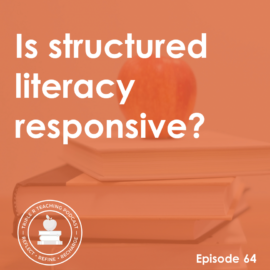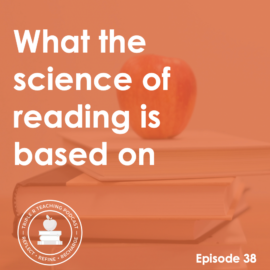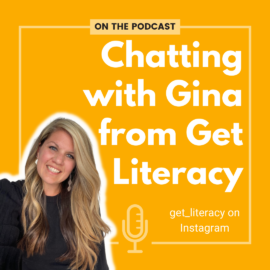
TRT Podcast #12: Can the Daily 5 and the science of reading coexist?
The Daily 5 is a popular framework for managing literacy centers in primary classrooms. Can teachers committed to the science of reading keep using the Daily 5?
Full episode transcript
Can the Daily 5 and the science of reading exist together? This is a big question that's been floating around, so I want to address it.
First of all, let's be clear about what the Daily 5 is. The Daily 5 is a management system designed to keep students busy doing literacy activities while the teacher is teaching small groups. In this episode, I'm just addressing Daily 5, I'm not addressing what the teacher might be doing in the small group. We're just going to talk about this management system for keeping the rest of the children busy and hopefully learning.
From the Daily 5 website we read: "Daily 5 is a literacy framework that instills behaviors of independence, creates a classroom of highly engaged readers, writers, and learners, and provides teachers with time and structure to meet diverse student needs. Because it holds no curricular content, it can be used to meet any school, district, state, or national standards. Daily 5 classrooms produce productive, highly engaged students who develop a true love of literacy.
"During Daily 5, students select from five authentic reading and writing choices, working independently toward personalized goals, while the teacher meets individual needs through whole-group and small-group instruction, as well as one-on-one conferring."
Now I want to say that the two sisters, Gail Boushey and Joan Moser are brilliant when it comes to classroom management. One thing I really got out of that book was how to teach students to work independently, and I would absolutely recommend getting the book just to learn how to teach students to work independently at centers or stations. I personally am fully on board with meeting with small groups for explicit instruction and therefore needing something beneficial for other students to do.
The Daily 5 activities are: Read to Self, Listen to Reading, Read to Buddy, Word Work, and Work on Writing. Some of these may be particularly useful for certain children. That said, having beginning readers or struggling readers spend long periods of time doing some of these activities may not be the best idea, particularly in the primary grades - kindergarten, first, and second.
These students really need explicit instruction in learning to read, and unfortunately, I think that for many teachers, I know I can go back in time and look at myself and raise my hand, this long period of independent work replaces explicit instruction. I thought that my students would become stronger readers just by doing lots and lots of reading every day. And yes, reading practice is important, but when I look back, I can certainly remember that many of them were off task and I just didn't have enough time to do individual conferring with all my students enough to make it beneficial. It was really just two minutes here, two minutes there. They would've been better served with explicit instruction.
Now again, I do think that small group instruction is important and valuable so we do need these other activities to keep the other students busy and learning. I think the Daily 5 framework, this idea of training students to work independently, choosing between activities, could work with a knowledgeable teacher. But we always want to make sure that whatever activities we choose, they are activities our students can do on their own with little to no support. If they cannot, we need to rethink it. And of course we want to make sure we train them to work independently and not just throw them at center and say, "All right, do this," because then we're setting ourselves up for failure.
So does the Daily 5 align with the science of reading? I think the idea of having students work independently while you're teaching small groups explicit small group lessons is a good one, but we want to make sure that what our students are doing really makes sense for how students learn to read and for what our students are capable of.
We're going to go into that more next week when I'm going to share literacy center ideas that are aligned with the science of reading. You can find the show notes for this episode at themeasuredmom.com/episode12.
Sign up to receive email updates
Enter your name and email address below and I'll send you periodic updates about the podcast.
Subscribe & review in iTunes
Are you subscribed to my podcast? If you’re not, I want to encourage you to do that today. I don’t want you to miss an episode! Click here to subscribe in iTunes!
Now if you have an extra minute, I would be really grateful if you left me a review over on iTunes , too. Those reviews help other people find my podcast, and they’re also fun for me to go in and read. Just click here to review. You’ll need to click to “Listen on Apple Podcasts” and “write a review.” Let me know what you appreciate about the podcast. Thank you!







Allison Lawrence
It is clear that you are a professional because your advice is conscious and you clearly explain what and why we need to do.
It is certainly a long process, and children are quickly tired of practicing writing.
You can teach your child to write individual letters, but after that, he or she might not be able to write the words and sentences correctly, and it will be much harder to correct if he or she does not like to write.
I like your advice that you should read your child as much as possible so he or she can write better. Because, surprisingly enough, it works. And even better in the future that he/she read as much as possible, and then writing will be literate and accurate.
Thank you!! Your advice gave me some great ideas, which I am in a hurry to put into practice!
Kate Dowling
Thanks for your comments, Allison!
–Kate, Anna’s Assistant
ann
Hi Anna
You are incredible mom and a teacher.I have been following you from last couple of week, I try to listen your podcast and read your articles about teaching…… ever day i fall in love with your way of explain thing and teaching material you have on your website …. please don’t laugh. English is not my first language ,so i am not good in writing thing.
Anna G
I think your English is wonderful, Ann! I’m so glad you can use my resources! 🙂
Victoria
Thank you for these tips. I’m gonna do this with my daughter though we’re just on remembering action words co’z english is not her main language. God bless you and keep inspiring mothers. Stay safe?
Tamika
Thank you so much for your tips! I would not survive this without you!